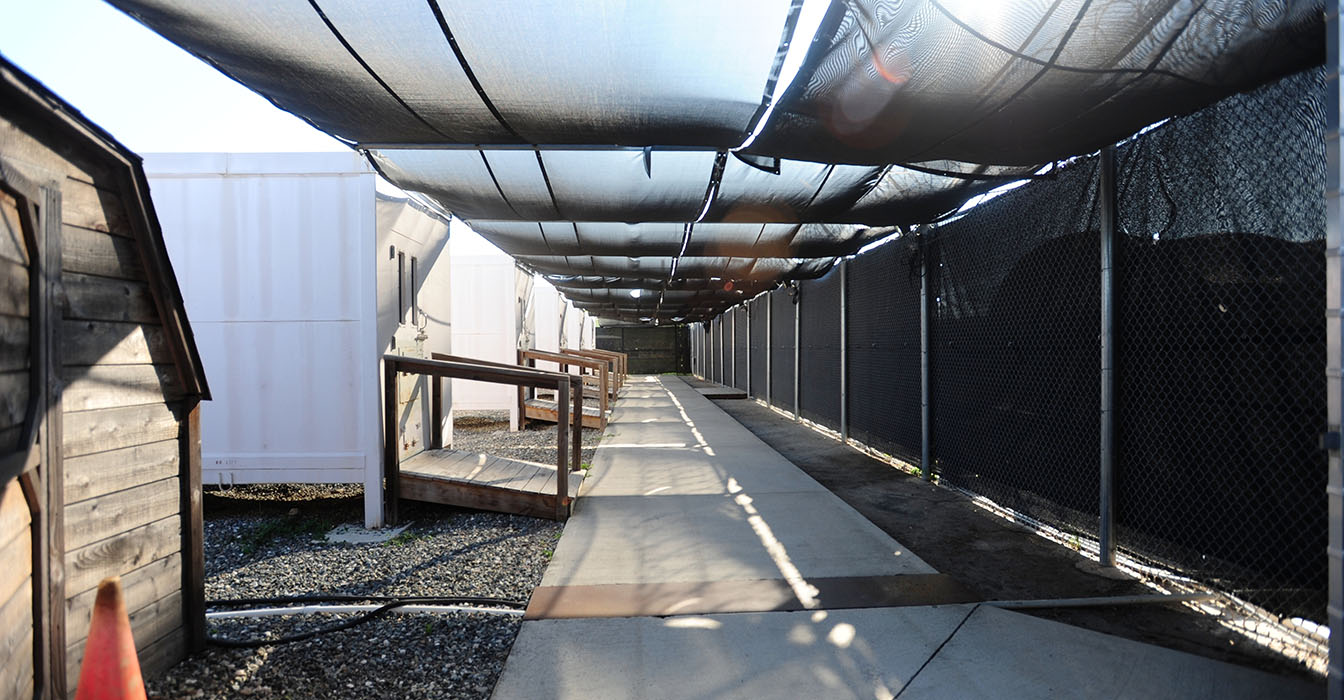9/11 Judge Dissatisfied With Torture Disclosure by Prosecution
By John Ryan | July 25, 2016 | News Articles, Guantanamo Bay, News & Features

A view of the detainee holding cells near the court where the five Sept. 11 defendants will be tried. (Photo courtesy of Joint Task Force Guantanamo, Public Affairs.)
Guantanamo Naval Base, Cuba – The military judge presiding over the Sept. 11 case said on Monday that he is largely dissatisfied with summaries provided to him by prosecutors about the CIA interrogation program conducted at secret black sites around the world.
“Virtually all of it has gone back for additions,” Army Col. James Pohl said when updating the defense teams on the Rendition, Detention and Interrogation (RDI) discovery process, which will play a key role in the case.
The five defense teams are entitled to details of the so-called “enhanced” interrogations endured by their clients before they arrived at Guantanamo Bay in September 2006. Defense teams will seek to suppress statements their clients made after they arrived at Guantanamo, claiming they are tainted by prior treatment at CIA black sites. The evidence is also relevant to mitigation efforts by defense lawyers who claim that the government should be barred from executing the individuals it tortured.
The chief prosecutor, Army Brig. Gen. Mark Martins, has repeatedly told members of the media that his team is working “24 hours a day, 7 days a week” – including all holidays – to meet an RDI discovery deadline of Sept. 30. The five defendants were arraigned in May 2012; a trial date is still not set.
Martins says the prosecution is following commission rules modeled on the Classified Information Procedures Act (CIPA) that allows the government to provide the judge with substitutions, summaries and redacted versions of classified evidence. Pohl then compares these submissions against the original evidence to determine if they provide defense lawyers “with substantially the same ability” to make their defense as if they had access to the original evidence.
Pohl told the Camp Justice courtroom late Monday that he has seen about 50 percent of the total information the government plans to give him on the RDI program. He said that “very little of it is completed” because he wants additions made to the summaries before they are provided to the defense lawyers, who will not see the original evidence.
“It’s a good sign that he’s engaged in a careful review of the government’s proposed discovery,” James Connell, the lead attorney for one of the defendants, Ammar al Baluchi, said after court. “At the same time, it’s disheartening that the government is redacting so much information that the judge is sending it all back.”
Connell also said he was concerned that, at present, the court docket has not been documenting the requests for substitutions of original evidence that Pohl described.
In court, Pohl said he would “look at this issue” of how the activity should be tracked in response to inquiries by Connell.
Just last week, defense lawyers for alleged plot mastermind Khalid Sheikh Mohammed and two other defendants contended that Pohl and prosecutors colluded to destroy evidence related to a CIA black site – a charge angrily denied by prosecutors, who say they provided adequate substitute evidence.
The same three teams want Pohl and the entire prosecution team removed from the case. Connell's team wants the prosecution removed, and to voir dire the judge about what happened. (A fifth team plans to seek remedies at trial or sentencing.) In a roundtable with the media Sunday, several defense lawyers expressed doubt that Pohl had seen the original evidence at issue in that dispute, conjecturing that might have required travel to a former CIA black site.
Pohl is scheduled to hear oral arguments on the recusal motions in October. Most of those arguments are expected to take place in open court.
The first half of Monday's hearing dealt with the government’s motion to block defense teams from disseminating letters and other media from their clients to third-parties – including the media – even when that information is not classified.
Martins told Pohl that defense teams were exploiting the judge’s 2013 order on how to handle such communications by interpreting just about everything from their clients as “legal mail” not subject to additional review by Joint Task Force Guantanamo, which runs the detention facility. The “ever-expanding” legal-mail definition had become a “gaping hole” that allowed the teams to bypass the legal and appropriate regulation of the detainees’ speech, Martins said.
Defense lawyers contend they are abiding by the rules by submitting client letters for classification review and only disseminate the materials if they are determined to be unclassified. Lawyers told Pohl Monday that the process is necessary to interact with nongovernmental organizations, experts, client family members and potential witnesses that may assist with the advocacy of their clients.
The impetus for the government’s motion, filed Feb. 2014, was the Huffington Post’s publication of a 36-page manifesto by Mohammed. Nevin reminded Pohl that his team had first submitted it for classification review and it was determined to be unclassified.
What the government views as propaganda are ideas that will be part of his client’s defense, Nevin said.
“That’s what these proceedings are all about,” he added.

